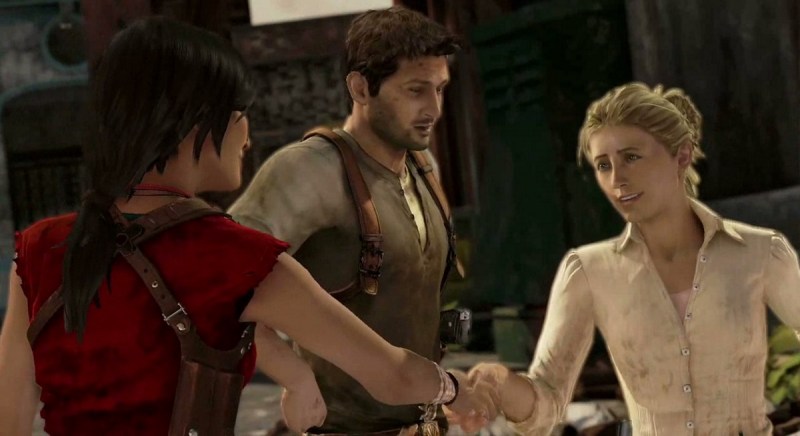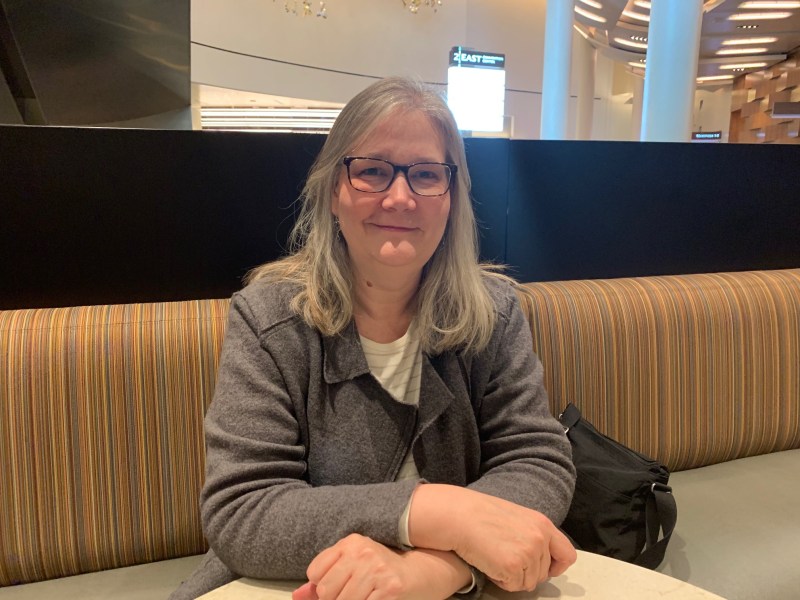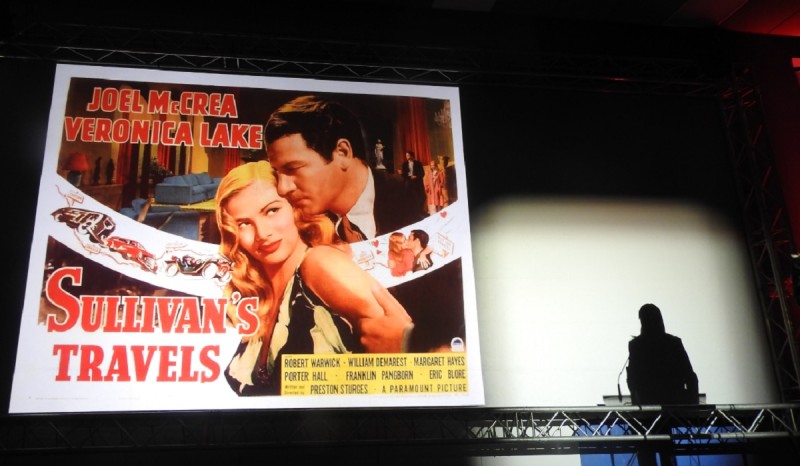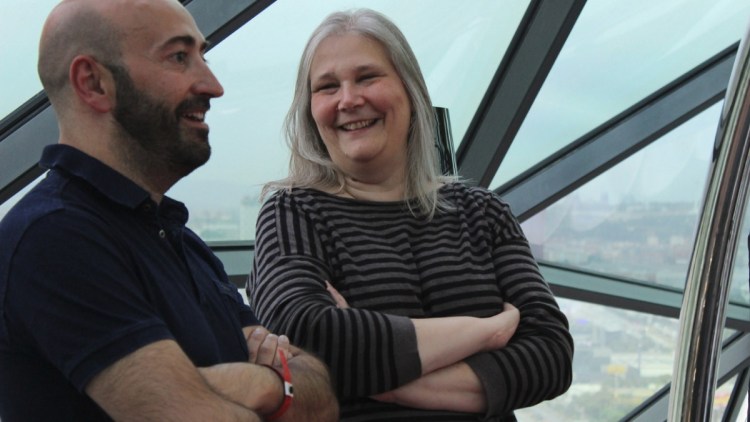Amy Hennig has received many kudos over the years for her career making games such as the Legacy of Kain games and the Uncharted series. Those games had memorable characters and stories, even if they were “just video games.”
But she doesn’t view herself as a celebrity in gaming. Instead, she tries to exhibit humility when it comes to talking about her life crafting video games.
After all, not everything has been rosy. Hennig left Naughty Dog in 2014 and went to work at Visceral Games at Electronic Arts. She was in charge of designing a Star Wars themed game with the former Battlefield Hardline game studio. They were making a story-based, linear action-adventure game set in the Star Wars universe.

Above: Chloe meets Elena in Uncharted 2: Among Thieves.
But things didn’t go as planned, and in October 2017, EA decided to kill the project and shut down the Visceral Games studio. As it did so, EA executives said that single-player story-based campaign games are difficult to justify in an era of live operations.
June 5th: The AI Audit in NYC
Join us next week in NYC to engage with top executive leaders, delving into strategies for auditing AI models to ensure fairness, optimal performance, and ethical compliance across diverse organizations. Secure your attendance for this exclusive invite-only event.
I caught up with Hennig at the DICE Summit event in Las Vegas. I asked Hennig about that painful experience and she offered her own views on what happened.
As discouraging as that was, Hennig is still bent on making games with complex characters and deep stories. She has started her own independent game studio, and she has been inspired by younger game developers who come up to her at events and say that her games are why they got into the game business.
We had a long conversation about the craft of making the kind of games she enjoys. We touched on why writers embed literary references in games, leaving Easter Eggs for the erudite gamers. Such details show the care that goes into making a game that may take hundreds of people and years of toil to create. I could tell she was still very much invested in the stories and characters she created at Naughty Dog.
And I’m very interested to see where Hennig, who made some of my favorite games of all time, goes next. We had a long talk. But I hope you’ll find it as fascinating as I did. Here’s an edited transcript of our interview.

Above: Amy Hennig at the DICE Summit in Las Vegas.
GamesBeat: It’s fun to see you become more of a celebrity in the game industry.
Amy Hennig: [laughs] I don’t know why that is. I guess because I rarely poke my head out, so it makes me a strange and unusual creature. A Bigfoot or something.
GamesBeat: I felt like, after Uncharted, the fascination with who wrote the story, who came up with these characters, it got more intense. For you, did you find that there was a pre-celebrity life and a post-celebrity one?
Hennig: I don’t feel like a celebrity, so I guess it’s all pre-celebrity for me. The only time I feel like that is when I come to an event where I’m more recognized. But it’s flattering. I guess there’s less anonymity, where you can just walk around, but it’s not like — in the sphere of celebrities, I’m not a very big one.
It’s mostly nice, because a lot of young people come up to me, game designers, who will say that they got into this because of me. “I didn’t imagine myself having this career, but then I saw you.” That makes everything worth it.
GamesBeat: Is there a Spider-Man thing there for you? Great power and great responsibility? With great celebrity comes great responsibility?
Hennig: [laughs] No. I mean, with great celebrity comes great humility, maybe. When you’re just working away and you have your nose to the grindstone, going through all the trauma of trying to make a game, it’s easy to forget that there are people out there that see it and play it and receive that in a way that’s changing their lives.
It’s hard to imagine, but the fact that people have reached out and said that games help them through a tough time in their life, or they shared it with a terminal parent and played through games together, or it shifted the idea of they want to do with their career because they saw that a certain thing was makable, or that someone like me could make a game — that’s pretty cool.
GamesBeat: It’s good to see the recognition of where quality is.
Hennig: Well, thank you. That means a lot. I’m very touched that there seems to be so much love and affection for the work that I’ve done. When you ask about post-celebrity life, if you call it that, it’s just the fact that people in the industry have been very welcoming. It’s not hard for me to pick up a phone or ask for a meeting and get to talk to folks, be able to talk shop. The biggest difference is access, I guess. It doesn’t make it any less paralyzing to be in the situation, but….
GamesBeat: You get the chance to do bigger things, bigger projects. Get a hold of $100 million or something.
Hennig: That’d be nice. Nobody’s throwing that kind of money at me. People are more likely to trust you, I guess, if they see you’ve delivered before, but all these $100 million bets are scary for everyone. It doesn’t matter what your track record is. Everything’s so volatile. The industry changes so much. It takes so long to make these games, and a lot can change over the course of development.

Above: Amy Hennig, talking about Sullivan’s Travels
GamesBeat: When you gave that talk in Montreal about Sullivan’s Travels, [a 1942 film that was referenced in Uncharted and sent a message that escapist fun is OK] I thought that was a nice speech. We were both English majors at Berkeley, right? It felt like something an English major would do, to build references like that into a work of art.
Hennig: We do all these little things that just please us, that nobody’s going to pick up on unless we tell them.
GamesBeat: But to layer some extra meaning into it that people aren’t expecting….
Hennig: Yeah, a few people will pick it up. I put things in ancient Greek — there’s a blackboard in the bar, I think, in Uncharted 2, where I put something in ancient Greek. I did two and a half years of ancient Greek in college. I don’t know why. No point. I just wanted to learn a language that didn’t look like English. I put a little Easter egg to myself there. I don’t know if anyone ever caught it but me.
GamesBeat: It’s funny that all these literary references used to be called other things, but now they’re Easter eggs.
Hennig: Exactly. It was a reference to Homer. Yeah, you need footnotes for these Easter eggs.
GamesBeat: It also seems like it elevates the writing of the story for video games.
Hennig: Having a literary background, you mean?
GamesBeat: Layering in things like that. This is really the story of the Odyssey layered on top of a different, modern tale.
Hennig: Do you find that’s more common these days?
GamesBeat: I don’t think I notice as much of that at all in something like Red Dead.
Hennig: Yeah, more like pop culture references and things. Not Red Dead specifically, but you see more of that kind of layering going on. Not something as nerdy as ancient Greek or T. S. Eliot.
GamesBeat: It can make it feel more special to people, though, make them feel like they’ve discovered something.
Hennig: I think so. Also, sometimes I think maybe it just resonates in a way. If you’re calling back to something that resonated in the past, it resonated for a reason. Maybe it just makes it a little richer somehow. A lot of people have commented on that stuff. Even if they’re not sure where something came from, they can tell it’s a reference. It feels like there’s something to discover if you dig a bit.
That was the basis of all the historical references, the fact that it was based on real history. When we do our exposition dumps about the historical mysteries, that stuff’s all real and true. People can look it up. All the spoken languages, all the written languages are correct. There’s a care that I think we always try to put into the games.

Above: Sully and Nathan Drake in the Uncharted series.
GamesBeat: It seemed like a lot of extra work for something that might go unnoticed in Uncharted.
Hennig: Maybe? But I think the thing is — again, it’s resonating. We always said that we should try to base those stories off kind of grade-school knowledge. Or at least you’ve heard of Marco Polo. You’ve heard of Francis Drake. You may not know anything about them, but you feel like you do. If it starts getting too literate, or too obscure, it doesn’t have the same effect.
What you want is — here’s the historical nugget we all know is true, or we think we do, and then what if? What if there was more to it? If you were going to make up a thing, it feels to me that falls in that sort of mumbo-jumbo problem. Weird on weird. Okay, I have to accept this thing that I don’t know anything about, and you’re going to twist it. Give me something firm to stand on first.
Plus, it’s fun for us, because in the research phase you can grab on to real things. That gives you ideas. You find a picture of a thing and think, “Okay, now we know what the pirate island looks like.” It gives you some foundation to build from as the creator.
GamesBeat: Speaking of weird on weird, at some point in all the Uncharted tales, the supernatural thing comes to life for real.
Hennig: That’s what everyone said about the first Uncharted. The thing is, one of the big inspirations was Doc Savage, which was the precursor to things like Scooby Doo. There’s some mystery, and it seems supernatural, and you have all these clues that you don’t know how to read, but it gives you the whole spooky supernatural vibe of the story. Then, in the denouement, you think, “Oh, there’s an explanation for it.”
We tried to do that. You don’t have quite the same supernatural stuff in, say, Indiana Jones. Or obviously you do with the opening of the Ark of the Covenant, but in terms of mummies and things. With the propulsion at the ends of the stories, all you can do is maybe drop hints that there’s a biological explanation for this. But you don’t have the time to stop and say, “Okay, let’s explain this.” There’s no scene where you pull the rubber mask off the farmer. But that’s where that came from, Doc Savage. That feeling that there’s something eerie and supernatural going on.
GamesBeat: It happens in the Lara Croft reboots as well.
Hennig: That was always a bit more in their DNA. I could see us not including that, but it seemed like it was such a pulp adventure thing, that feeling of something arcane and supernatural behind the scenes. And then giving it the final twist if you can. Maybe it’s a virus? But we never had much time to lean into that stuff. We just had a bunch of slippery naked guys at the end and called it a day.

